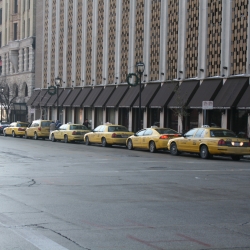Transportation Freedom Wins in Federal Court
Federal Appeals Court: Taxis’ Claim to Medallions “Borders on the Absurd”

Joe Sanfelippo. Photo from the State of Wisconsin Blue Book 2015-16.
Chicago—Today, the 7th U.S. Circuit Court of Appeals issued two groundbreaking decisions that serve to solidify the ability of cities to sweep aside outdated protectionist transportation regulations in order to make way for new entrepreneurs. Both cases were brought by taxicab companies upset that new regulations governing ridesharing and medallions allowed greater competition and disrupted their longstanding monopoly power.
“These cases clear the way for transportation freedom across the country,” said Institute for Justice Senior Attorney Anthony Sanders, who represented drivers and entrepreneurs in both cases who intervened to defend their economic liberty. “In city after city, we are seeing lawsuits like these filed by incumbent businesses that want to freeze the current regulatory environment in amber. For too long, cities across the country have embraced an outdated mode of transportation regulation that says competition is to be feared and that freedom for taxi drivers or other transportation entrepreneurs is unthinkable. Today’s rulings confirm that there is absolutely no legal barrier to other cities’ joining the rising wave of cities embracing transportation freedom.”
Writing for the Court in a case challenging Milwaukee’s removal of a cap on taxicab medallions, Judge Richard Posner opines:
The plaintiffs’ contention that the increased number of permits has taken property away from the plaintiffs without compensation, in violation of the constitutional protection of property, borders on the absurd. Property can take a variety of forms, some of them intangible, such as patents. But a taxi permit confers only a right to operate a taxicab (a right which, in Milwaukee, may be sold). It does not create a right to be an oligopolist, and thus confers no right to exclude others from operating taxis.
The first case originated in Milwaukee, where Joe Sanfelippo Cabs, long the largest taxicab operator in the city, filed suit claiming that the city violated both the U.S. Constitution and Wisconsin state law when it lifted a longstanding cap on the number of taxicabs it would allow to operate. The removal of the cap—which came about after a court declared the cap unconstitutional in response to a lawsuit brought by several local taxicab drivers represented by the Institute for Justice (IJ)—sparked a huge influx of new cabs, revealing long-suppressed demand for greater transportation options in the city. The second case comes out of Chicago, where incumbent taxicab operators sued the city for permitting ridesharing services like Uber and Lyft to operate; in that case, the plaintiffs asserted that city officials’ failure to go out and arrest ridesharing drivers violated the taxicab owners’ rights under federal and state law.
In both cases, IJ represented drivers and entrepreneurs who challenged the existing monopolies and intervened in these two resulting suits to make sure that their competitors did not succeed in using the courts to roll back these new expansions of economic liberty. And both cases came down to essentially the same legal question: Are cities allowed to remove outdated barriers to entry without first paying off an incumbent monopolist? And in both cases, the answer was a resounding yes.
In recent years, cities across the country—from San Diego, California, to Sarasota, Florida—have removed outdated protectionist laws. That wave of pro-freedom reform should only increase now that its legality has been validated by a federal appellate court.
“Today’s decision is a pivotal moment for transportation freedom,” said IJ Senior Attorney Robert McNamara. “It builds on a landmark victory IJ won more than ten years ago in Minneapolis, and it represents the first time a federal appellate court has weighed in on the ridesharing revolution. With similar cases brought by entrenched interests in New York, Boston and elsewhere, we’re confident that today’s decision will lead the way toward greater economic liberty for transportation entrepreneurs across the country.”
NOTE: This press release was submitted to Urban Milwaukee and was not written by an Urban Milwaukee writer. While it is believed to be reliable, Urban Milwaukee does not guarantee its accuracy or completeness.
Recent Press Releases by Institute for Justice
Transportation Freedom Wins in Federal Court
Oct 7th, 2016 by Institute for JusticeFederal Appeals Court: Taxis’ Claim to Medallions “Borders on the Absurd”
Taxi Owner-Drivers Officially Join Lawsuit to Stand Up for Transportation Freedom
Apr 15th, 2015 by Institute for JusticeCheema, Malik and IJ have asked the court to dismiss the cab companies’ lawsuit.
Milwaukee Taxi Owners Sue to Block New Law
Aug 25th, 2014 by Institute for JusticeIndependent taxi drivers and Institute for Justice attorneys promise vigorous defense
























More locally owned and operated taxis I can support, but I do not support extractive industries such as Uber. Money leaves Milwaukee under these latter types of transportation options.
I agree with Barbara.
And more “locally owned and operated
taxiscars for hire” is exactly what happened. Yes, Uber gets a cut, just the way Joe Sanfelippo Cabs did when they were in control. Except when Joe Sanfelippo Cabs, et. al. were in charge, additional people seeking to operate cabs / transportation for hire couldn’t. Did Milwaukee have demand for more than 321 taxis? Apparently so.“Money leaves Milwaukee”…Because Joe Sanfelippo (Cabs) re-invested in Milwaukee itself for the betterment of society?
BTW, the term “extractive industries” is typically applied to those physically digging or drilling in the earth.
My issue with Uber and Lyft and the like is lack of regulation. Oh, I can hear it now – regulation is bad for business but it was deregulation that led to all the bullshit at the banks that caused the recession and most likely deregulation led to the BP oil spill. There are probably a ton of other things that have happened due to deregulation. “Self-regulation” does not work. And there are too many horror stories that come out both about bad drivers and about unfair practices being done by Uber to its drivers. Seems to me Uber and Lyft have gotten too big and those companies have little oversight – that’s a bad combination.